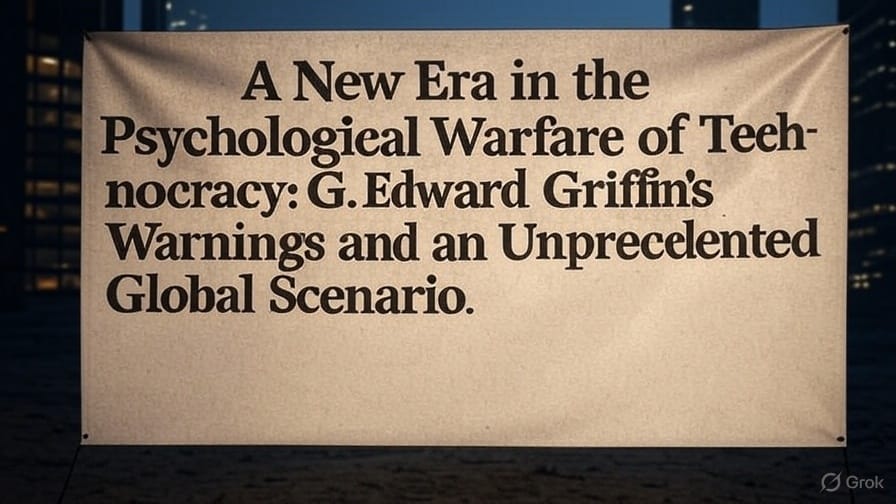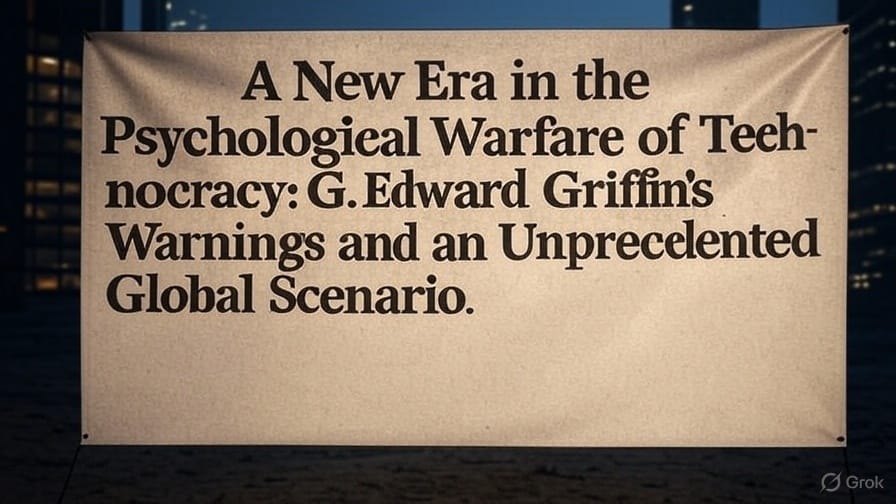A New Era in the Psychological War of Technocracy: G. Edward Griffin's Warnings and an Unprecedented Global Scenario

Introduction
In today's world, technocracy—the system where technical and scientific advancements shape societies—triggers one of the deepest transformations in human history. The interview conducted by Josh Sigers with G. Edward Griffin reveals the alarming dimensions of this transformation. As a long-time figure warning against the rise of technocracy, Griffin emphasizes that wars, propaganda, and control mechanisms have evolved into an entirely new dimension. In this article, drawing from the examples in the transcript, I will explain that the current situation is an unprecedented phenomenon in human history. I will detail its characteristics using the examples provided in the interview, such as the psychological weaponization of threats and the role of technocracy in reaching human minds. The goal is to raise awareness about this unique threat and discuss its implications, with no length restrictions to ensure thorough coverage.
In the interview, Griffin highlights that wars and threats have shifted from traditional means to a psychological war, enabled by technocracy. For instance, he describes the threat of atomic war as more of a psychological tool than a military one. This was never possible before because technocracy provides the technical means to access the minds, fears, hopes, and basic instincts of every human being. Now, let's delve into this in detail.
The Uniqueness of the Current Situation: An Unprecedented Scenario Never Before Experienced
As Griffin repeatedly states in the interview, technocracy has created a form of control that humanity has never encountered in history. This is not just about technological progress but also about how these tools directly intervene in individuals' most fundamental instincts—fear, hope, and survival. The phrase from the interview, "This is something that never happened before, never could happen before, because of technocracy," captures the essence of this uniqueness. In the past, wars and conflicts were typically fought in physical spaces, such as battlefields. However, today, technocracy has transformed them into a psychological dimension, creating effects that were previously impossible.
The Psychological War Enabled by Technical Advancements: Characteristics of This First-of-Its-Kind Phenomenon
In the interview, Griffin provides examples of how the atomic war threat serves as a psychological weapon. Even during the Cold War, nuclear threats were limited to their potential for physical destruction. But today, technocracy turns this into a fear mechanism. For example, media and AI tools allow this threat to be embedded instantly in every individual's mind. Griffin says, "Because of the technical advancement of the means, the technical means of reaching the minds and the fears and the hopes and all the base instincts of every human being." This is unprecedented because:
- Universal Access and Speed: Technocracy enables propaganda messages to reach billions instantly through social media, AI, and data analytics. Drawing from the interview's reference to Nazi propaganda, the tactic of "Tell a big enough lie and repeat it often enough, and everyone will believe it" is now applied on a global scale. For instance, just as the "weapons of mass destruction" lie was used in the Iraq War, the current narrative about Iran's ballistic missiles follows the same pattern. However, the difference lies in technocracy's ability to personalize this lie through AI-driven algorithms, making it far more effective than past mass communication tools like radio or newspapers.
- Biological and Psychological Layers: Griffin points out that technocracy not only targets minds but also bodies. In the interview, he mentions, "They give us drugs, they get us doped up, they put stuff in our water supply, telling us it's good for our teeth, and they're trying to reduce the population by reducing fertility rates." This includes strategies for population control. No previous era allowed governments or the "cabal" to intervene biologically with such precision. For example, during the COVID-19 pandemic, emergency orders and digital IDs exemplified this new dimension of technocracy. As Griffin puts it, "Now the war is much bigger and much more invisible... psychological ways, and now biological ways, first time in history."
- An Advanced Form of Divide and Conquer: The interview discusses how wars have always been a favorite tool for "divide and conquer." However, technocracy has made this tactic more sophisticated than ever. For instance, the influence of the Israeli lobby on conservatives is explained as propaganda programming minds like "little AI computers." Griffin notes, "It's propaganda. It's training of the minds in a way we're all kind of little AI computers." This is unprecedented because technocracy manipulates individuals through social media algorithms, personalizing the perception of enemies in ways that were impossible in the past.
These unique aspects are further clarified by other examples in the interview, such as scandals involving Jeffrey Epstein and Mossad agents, which represent blackmail and combine with technocracy's data-gathering capabilities to achieve total control. Griffin emphasizes, "This is not the old style of warfare anymore. Warfare is not military anymore."
Connections to Current Events: Examples from the Iran and Iraq Wars
The interview connects these points to contemporary events, such as the Iraq War and the push toward war with Iran. Griffin states, "We've been down this path before... it's that propaganda." He compares the repeated metrics, like the false claims of weapons of mass destruction in Iraq and now Iran's missiles, which are portrayed as threats to the US. However, the key difference is technocracy's role in amplifying these narratives.
- The Fear Cycle: Threats are constantly fed through social media and news algorithms, keeping individuals in a state of fear. Griffin warns, "The threat of atomic war is more of a psychological weapon than it is a military weapon... we're being conditioned to accept war the old-fashioned style as the only solution." This creates a cycle that was never before possible, as technocracy fosters global dependency on fear.
- Digital Infrastructure and Emergency Orders: The interview discusses concepts like digital IDs, CBDCs (Central Bank Digital Currencies), and 15-minute cities. These tools allow technocracy to bind people to social credit systems during emergencies. Griffin alerts, "AI and digital IDs are being used to justify wars." This is unprecedented because technocracy enables physical surveillance and control in real-time.
The Threats of Technocracy and Proposed Solutions
These unique features of technocracy make individuals more vulnerable. In the interview, Griffin stresses the importance of preparation: "Stock up on things like storable food, water filtration, backup electricity." He references sites like heavensharvest.com and Whambeef.com as ways to achieve independence from the system. This is a direct counter to the dependencies created by technocracy.
Additionally, events like the Red Pill Expo are presented as key solutions. Griffin describes it as, "The main focus of our upcoming Red Pill Expo... to help people understand these tactics." The Expo, scheduled for July 12-13 in Tulsa, Oklahoma, provides a platform for promoting individualism and breaking through propaganda. The interview details how it brings together speakers and attendees to foster community and knowledge.
Conclusion: The Legacy of Freedom and a Vision for the Future
G. Edward Griffin's interview clearly demonstrates that technocracy has thrust humanity into a psychological war that has never been experienced before. Its characteristics—universal access, biological intervention, and advanced propaganda—set it apart from past conflicts. However, Griffin's vision is hopeful: "Freedom restored... I think freedom is the missing ingredient of Homo sapiens." In the interview, he expresses his desire for his legacy, 50-100 years from now, to be a world where humanity achieves true freedom.
This can be possible if individuals break through propaganda walls, prepare themselves, and build communities. Ultimately, addressing the threat of technocracy is not just an individual responsibility but a collective duty. Platforms like the Red Pill Expo and Griffin's warnings serve as guides on this path. If we understand and act on this unprecedented threat, we can witness the triumph of freedom.
Turkish version






Comments ()